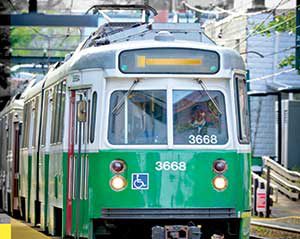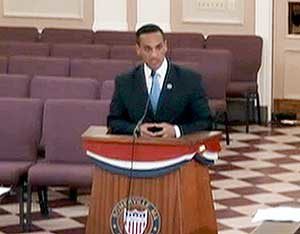
There will be a lot of debate and deliberation in the future, according to civic leaders, as the city looks for ways to cover the $50M that has been pledged to help see the Green Line Extension through its completion.
By Josie Grove
Now that the MBTA has given its cautious go-ahead for the Green Line Extension, the city of Somerville is trying to figure out how to make good on Mayor Joseph Curtatone’s $50 million promise to the project.
The GLX project underwent a cost-cutting redesign, which disappointed many residents but became necessary after its estimated cost ran nearly $1 billion over budget last year. In addition to the redesign, the administrations of Cambridge and Somerville pledged to contribute $25 million and $50 million respectively. The project was approved last month, but it remains to be seen if Somerville will follow through on the mayor’s pledge to the state.
“I want to get you up to speed in terms of where we are with the GLX discussion,” said Curtatone, addressing the Board of Aldermen last Thursday.
“The Federal Transportation Administration signaled last week officially that the redesign is a go.” This federal approval was critical because nearly half the project is funded by an FTA grant. The new budget for the project will be ready in August. Project procurement will be followed by a design-build bidding process, a different strategy than the last bidding process used for the Green Line. The MBTA believes the new process will more effectively keep the project under budget. Curtatone anticipates that the GLX will resume construction by fall 2017.

Mayor Curtatone addressed the Board of Alderman last week, updating the members on where GLX funding efforts currently stand.
To keep up that ambitious schedule, city funding must be approved by end of this August. Curtatone said the Board of Aldermen would have his plan for how the city will come up with the $50 million by the end of this month.
“I’m sure you’ll scrutinize that in a very stringent manner, hold public hearings,” said Curtatone. “Whatever approval the board gives, you’ll look at it very carefully before you give that.” The mayor said he hopes to spread the $50 million impact over time and avoid cuts to other city initiatives, but did not yet have specifics for the Board. A concrete plan will come by the end of June, and Curtatone hopes the Board of Aldermen will approve it by September.
“I apologize for the strain the time constraint will put on all of us with the Green Line, but with the changing federal administration, the presidency, we stand to lose in terms of federal funding,” said Curtatone. Regardless of political party, he said, the Green Line Extension might not be a priority for the next president or transportation secretary. “Time is not on our side.”
Ward 5 Alderman Mark Niedergang had another proposal to fund Somerville’s potential $50 million commitment to the Green Line: a fee on real estate transactions, known as a transfer fee. Niedergang claimed a 1% transfer fee, for example $5,000 collected from a $500,000 sale, would raise as much as $8 million per year. To get that extra revenue, the city would have to submit a Home Rule Petition to the Commonwealth legislature. The legislature would vote to approve the petition, and then the issue could return to the city.
Alderman Matt McLaughlin supports the transfer fee that takes advantage of developers “cashing out” of Somerville, while Alderman Heuston is concerned it would threaten people selling their only property.
Alderman Lance Davis was more cautious about using the transfer fee for the Green Line. “I think that there are a number of funding options that are still on the table,” he said. “I would hope that we can emphasize the important need to use this money [from the transfer fee] to specifically address our housing crisis here first and foremost.
But Curtatone thinks the process of imposing a transfer fee will be too slow to make a difference for the Green Line. “I think we may have missed the legislative timeline,” he said. “It just won’t happen fast enough.”
The home rule petition to charge a real estate transfer fee will still be discussed by the Legislative matters committee of the Board of Aldermen.
Between the transfer fee, Green Line funding, and a handful of other property tax-related issues slated for discussion this fall, Alderman White is preparing for battle in the city government. “It seems like we’re really going to be heading for a maelstrom this fall with all of these issues. So maybe we had better put on our flak jackets and helmets and be ready.”















The new sports/training complex being built in Allston includes New Balance Shoe Company constructing a complex. Included with this complex is a $50 million dollar “T” commuter line station which New Balance is paying the entire cost.
The GLX extension should get funding from Tufts, which will get its own GLX station and area businesses which also benefits.
In Colorado a university and its area businesses wanted the public trolley system extended into their area and the state made it mandatory that the University and businesses pay 50% of the cost.
LET’S TAKE IT OUT OF US HOME OWNER IN SOMERVILLE AGAIN JUST LIKE THEY DID DOWN IN ASSEMBLY ROW, YOU KNOW WE ARE SO RICH HERE IN SOMERVILLE, SO HERE GOES THE RENTS GOING UP FOR PEOPLE THAT ARE JUST MAKING IT BY
Some people don’t think before they say anything. Some of that Wynn money would have come in handy now.
…hey Steve, ya, Joe here, um yeah, that EPA suit I ot going against you, well I got a number for you to help make it go away…